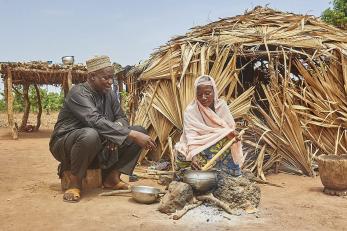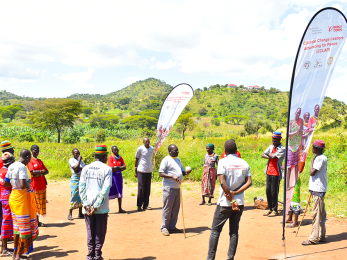Does Peacebuilding Work in the Midst of Conflict?

Impact Evaluation of a Peacebuilding Program in Nigeria
Read the executive summary ▸
Read the full report ▸
Persistent violence between farmers and pastoralists in Nigeria has contributed to more than 7,000 deaths in the past five years and costs the Nigerian economy $13 billion a year. Communities in the Middle Belt that once cooperated over natural resources are competing for increasingly scarce land and water as climate change intensifies, sparking migration further south in search of available resources. Underdevelopment and poor governance further contribute to a breakdown in traditional agreements, and farmer and pastoralist communities are fast becoming polarized as clashes take on religious and ethnic overtones.
In response, Mercy Corps and our local partner, Pastoral Resolve (PARE), implemented the USAID-funded Engaging Communities for Peace in Nigeria (ECPN), from 2015 to 2019 in the Middle Belt states of Benue and Nasarawa. The program included a combination of training leaders to mediate disputes, dialogue forums and projects jointly designed and implemented by farmers and pastoralists.
To test the program’s effects on peacebuilding outcomes, we used a randomized controlled trial (RCT) at the community level to examine the overall impact of the program on communities. We triangulated the results of the community-level RCT with a pre-/post-program analysis of individuals within communities to see how outcomes among direct participants — those most engaged in program activities — differed from outcomes among indirect participants — those living in intervention communities who were merely exposed to program activities. We also compared direct and indirect participants with those in control communities with no exposure to the program at all.
Overall, findings indicate that ECPN improved the conditions for peace in the communities in which it operated and among the individuals who participated most in activities that brought farmers and pastoralists together regularly. Specifically, we found:
- Intergroup contact and trust between farmer and pastoralist communities increased or deteriorated significantly less in ECPN sites than in control sites, even as regional tensions increased.
- Perceptions of security increased significantly more in ECPN communities than in control communities.
- Among individuals, as a result of the program, direct participants’ attitudes and behaviors improved more than those of indirect participants in ECPN communities, who in turn improved more than individuals in control communities.
These results point to the importance and effectiveness of peacebuilding investments, particularly in places with active conflict.

